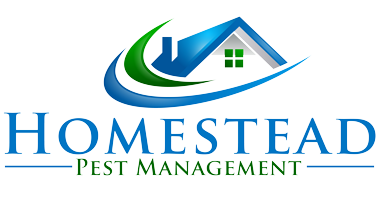HPM: West Tn’s Best Pest Control!!
When you call Homestead Pest Management, we listen to your problem and prescribe a treatment that will fit your individual needs after a thorough property inspection. We suggest the most beneficial service for your needs without overcharging for additional services you don’t need, because we feel that you should only pay for what is necessary to properly protect your property and not what makes us the most money.
With Homestead Pest Control you have multiple options for Pest Control including:
- One-Time Service Visits
- Monthly Service Visits
- Bi-Monthly Service Visits
- Quarterly Service Visits
- Inside Only Treatments
- Outside Only Treatments
- And MORE!
At Homestead Pest Management, we live with our families in West Tennessee and understand that times are hard for everyone. For that reason, we do not hold our fellow residents to a binding contract. If you need to cancel at any time, you can, and we will still be here for you when conditions improve.
Homestead Pest Management can take care of all your pest control needs whether it be roaches, ants, termites, mosquitoes, spiders or anything else that’s bugging you. Contact us today to schedule a complete individualized assessment of your home and property.
Why choose HPM for your West TN Pest Control Needs?
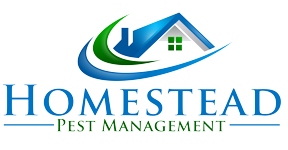
Why choose HPM? Because only the best locally-owned, locally-founded pest control service will do!
Homestead Pest Management, Inc. was founded in 1976 by Matt & Diane Markowski and is still owned and operated by the Markowski family. It is currently owned by their son David Markowski and their daughter Donna Tyler. Also their Son-in-Law Charles Moore is the Pest Control Manager.
Homestead Pest Management uses the latest techniques to eliminate pests, including using baits and low odor liquids. They were the first company in this area approved to use termite baiting systems and strive to always use products that will have the least amount of impact on the environment. All of the technicians employed by Homestead Pest Management are State Certified and undergo continuous training to stay on top of the newest techniques and developments in our field.
Matt Markowski was instrumental in forming the Local Pest Control Association, serving as its First President. He also served the Tennessee Pest Control Association as a Director, President and Committee Chairman. Diane Markowski has served as Secretary, Treasurer, and President of the Local Pest Control Association and has also served the Tennessee Pest Control Association as President, Director and Parliamentarian. She has additionally served as Director and Committee Chairperson with the National Pest Management Association. David Markowski has been President of the Local Pest Control Association and President of the Tennessee Pest Control Association. Donna Tyler is currently Secretary/Treasurer of the Local Pest Control Association.
Contact us today for a personalized assessment of your home and property!
Say Bye-Bye to Bed Bugs with HPM!
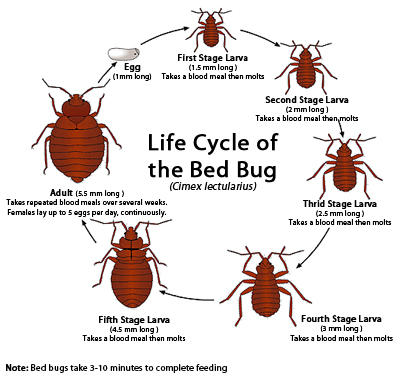
Contrary to popular opinion, bed bugs do not result from someone being dirty; they live solely on blood, so having them in your home is not a sign of poor housekeeping; they will infest any place that gives them a ready supply of blood. They do not carry diseases, but their bites are very itchy and uncomfortable, and if scratched may become infected. Bedbugs may enter your home undetected by hitching a ride on luggage, clothing, used beds and furniture, and other items; their flat bodies make it possible for them to fit into the tiniest of spaces. Bedbugs do not have nests like ants or bees, but tend to live in groups in good hiding places. Their initial hiding places are typically in mattresses, box springs, bed frames, and headboards where they have easy access to people to bite in the night. Over time, though, they may move through the bedroom, moving into any tiny, protected space. They may also spread to nearby rooms or apartments. Early detection is key in getting rid of these annoying pests as soon as possible.
If you wake up with itchy areas you didn’t have when you went to sleep, you may have bedbugs, particularly if you got a used bed or other used furniture around the time the bites started. Other signs that you have bedbugs may include blood stains on your sheets or pillowcases; dark or rusty spots of bed bug excrement on sheets and mattresses, bed clothes, and walls; bed bug fecal spots, egg shells, or shed skins in areas where bedbugs hide; and/or an offensive, musty odor from the bugs’ scent glands. If you suspect you have bedbugs, Homestead Pest Management can assess all the rooms in your home an come up with a specific plan for stamping them out and keeping them gone!
Homestead Pest Managment is your best stop for total pest management in West TN. We pride ourselves on our accurate, thorough assessments of your home and property, and are known for our personalized ongoing pest-control plans. Contact us today and let us help you rid yourself of any pest that is bugging you.
West TN Rife with Ticks this Summer
According to Jerry Genosie of Natural Unseen Hazards:
“Ticks are raising new concerns in Tennessee as new types and infections emerge. Tick-related illnesses have more than doubled in Tennessee since 2005. There were almost 400 cases last year, most of them Rocky Mountain spotted fever. There have been six deaths from Rocky Mountain fever in the state since 2001. Certain species of ticks that were uncommon in the state are being found in new areas. Ticks that were previously rare in Tennessee, such as Gulf Coast and deer ticks, have now been found to be much more widespread, possibly because of climate change. Both are associated with tick-borne infections. “It is a big concern because it can result in a fatality,” Abelardo Moncayo of the Tennessee Department of Health told The Tennessean.
Angela Doss said she lost three months to a tick bite. After camping at Old Hickory Lake, she woke up with a stiff neck and a blinding headache. Her brain was swelling from a bacterial infection from a tick. Doss was hospitalized for six days and saw a neurologist weekly for three months. She missed months of work. “I don’t go camping anymore,” she said with a laugh. “Or if I do, I am adamant about checking (myself) for ticks. Not everybody who gets bit by a tick gets ill. I was just the one who got it.”
Graham Hickling, a University of Tennessee research professor who is studying Lyme disease and other tick illnesses, said some tick-borne illnesses, if untreated, “could go very bad, very fast.” Nationally, Lyme disease gets the most attention. It has been concentrated in the Northeast, where deer ticks, also called black-legged ticks, transmit it. Hickling helps lead a five-state research group on Lyme. His students have found black-legged ticks throughout Tennessee, but in low numbers. And tests have not found the ticks carrying the pathogen that causes Lyme in humans.
Tick-borne issues in the Southeast are other things, he said. “If you are getting infected, the first candidate is the Lone Star tick, which is common and aggressive.” Lone Star ticks have been linked to ehrlichiosis, the illness that felled Doss. They also may carry Rocky Mountain spotted fever, which is being renamed as spotted fever rickettsiosis. Tennessee is among four Southeast states that have accounted for almost half of all nationwide cases of spotted fever since 1995.
In 2009, the state recorded its first case of babesiosis. The patient was a deer hunter, and the state tracked where he had been and found the Babesia parasites in deer ticks there, Moncayo said. Babesia requires different drugs than other tick infections. It can be spread through many types of contact, and there is no screening for donors, Moncayo said. All those factors have prompted the state and the federal Centers for Disease Control and Prevention to begin tracking Babesia cases for the first time this year. People are probably encountering ticks more often as suburban growth pushes into tick habitat, Moncayo said. Ticks typically get active when weather becomes warm in the spring. Infection reports peak in June and July.
Treatment is most successful within five days of symptoms. That’s why anyone who feels ill and has been around ticks needs to go to a physician and start treatment, even before blood tests show an infection. Most people recover fully, but some infections can cause lasting damage. And the longer an infection goes untreated, the more harm can be done. Moncayo said ticks are part of life in Tennessee. “You should still be able to enjoy the outdoors, but be aware they’re out there,” he said. “If you have a tick bite, don’t shrug off symptoms if they develop. But if you get a tick, don’t worry if you don’t feel sick.”
Homestead Pest Management offers an extensive array of pest control services, each individualized to your specific needs based on an initial on-site assessment of your property and a determination of the precise pest problem(s) you have. We then suggest the most beneficial service for your needs without overcharging for additional services you don’t need, because we feel that you should only pay for what is necessary to properly protect your property and not what makes us the most money. Ticks, spiders, ants, termites, fleas, rodents, bedbugs: are any of these pesky critters bothering you? How about mosquitoes? As part of our other services, Homestead Pest Management offers the latest in Mosquito Control! We have several services and packages to accommodate everyone’s budget. We can also install the MistAway System and service your system all summer long.
We have service plans for every schedule and budget, and best of all, we do not hold you to a binding contract – you can terminate services anytime with no hassle whatsoever.
At Homestead Pest Management we understand that proper protection from pests can be costly and for that reason we regularly provide coupons to help our customers get the treatment they need to care for their property, and our refer-a-friend program earns discounts for you as well for every qualified referral. Control the pests on your West TN property before they start controlling you! Contact us at Homestead Pest Management today to find out more!
Expert Pest Control with Homestead Pest Management of West TN

When you call Homestead Pest Management we listen to your problem and prescribe a treatment that will fit your individual needs after a thorough property inspection. We suggest the most beneficial service for your needs without overcharging for additional services you don’t need, because we feel that you should only pay for what is necessary to properly protect your property and not what makes us the most money.
With Homestead Pest Control, you have multiple options for Pest Control including:
- One-Time Service Visits
- Monthly Service Visits
- Bi-Monthly Service Visits
- Quarterly Service Visits
- Inside Only Treatments
- Outside Only Treatments
- And MORE!
At Homestead Pest Management, we live with our families in West Tennessee and understand that times are hard for everyone. For that reason, we do not hold our fellow residents to a binding contract. If you need to cancel at any time, you can, and we will still be here for you when conditions improve.
Homestead Pest Management can take care of all your West TN pest control needs whether it be roaches, ants, termites, mosquitoes, spiders or anything else that’s bugging you. Contact us today to schedule a complete individualized assessment of your home and property.
Let HPM Prevent Moisture-Related Problems in your Home
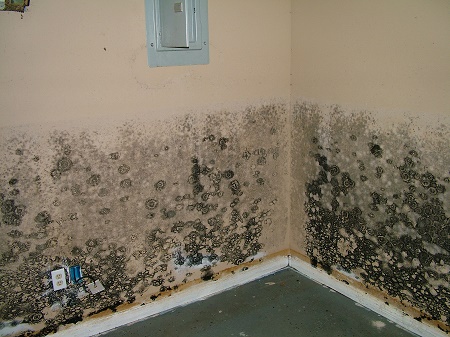
Excess moisture in a home can cause damage to the structure and illness in the occupants. It is important to take precautions to prevent moisture from causing damage and the growth of mold and mildew. Mold particularly can be very hazardous to people’s health, so steps should be taken to ensure that it does not get a foothold in your home. Homestead Pest Management offers moisture prevention services that can help keep excess moisture and the problems it causes at bay. Just how bad is it to have mold build up in your home? Jay Roman of TheNewYorkTimes.com had this to say about it in his 2001 article, “Your Home – The Dangers of Mold in Homes:”
“MOLD can cause health problems that range from itching eyes, sneezing and coughing to serious allergic reactions, asthma attacks and even permanent lung damage. And what many people do not know is that mold could be growing in their homes right now.
”I’ve gone into houses that are so neat and clean there’s not even a teacup out of place,” said Jeffrey C. May, principal of J. May Home Inspections, an indoor air quality testing company in Cambridge, Mass. ”Then I go into the basement and find mold growing on the legs of the furniture.”
Mr. May, the author of ”My House Is Killing Me: The Home Guide for Families with Allergies and Asthma” (Johns Hopkins University Press, 2001), said that while mold in a house is most often found on walls, floors, ceilings, carpets and fabrics exposed to moisture, one particularly troublesome hiding place is inside the ductwork and associated components of central forced-air heating and air-conditioning systems.
”This is the time of year my phone starts to ring off the hook,” Mr. May said, explaining that as homeowners start up their central heating systems many find themselves suddenly coughing, wheezing and sneezing.
Mr. May said that while mold needs moisture, oxygen, a food source and a surface on which to grow, a mold spore in search of a home can come by those essentials relatively easily, even inside a central heating system.
That is because such a system constantly circulates mold spores found naturally in the air through parts of the system that often have dust on their surfaces.
Once a mold spore has embedded itself in that dust — which provides the nutrients it needs — all the spore needs is moisture. And that moisture, Mr. May said, can come from condensation produced by the air-conditioning coil, from a faulty humidifier attached to the system, or even from high levels of humidity in the air itself.
While it is possible for mold to grow in the ductwork of a central heating system, he said, it is more common to find it in the parts of the system that collect the most dust and have the greatest potential for being exposed to moisture: the air-conditioning coil and its fiberglass lining, and the cabinet that houses the blower fan.
”I’ve seen coil linings that were completely infiltrated by mold,” Mr. May said, adding that when the heating system is turned on, the blower fan distributes mold spores throughout the house. ”Most people don’t even know they have a problem until they start getting sick.”
In most cases, he said, the only way to determine with certainty whether mold is growing inside a central heating system is to gain access to the coil, its lining and the blower, and take a dust sample from the surface of the components.
That sample must then be examined under a microscope. ”I’m looking to see whether there’s actively growing mold in the dust,” Mr. May said.
He explained that he looks for actively growing mold because it is possible for mold spores from other areas of the house to get caught in the dust in the furnace.
”I’m trying to distinguish between mold that is being collected in the system and mold that is growing in it,” he said.
The cost of an inspection can range from $200 to $1,000 or more, depending on scope and complexity.
If active mold is found in the heating system, Mr. May said, a homeowner should hire a professional remediation expert — preferably one certified by the National Air Duct Cleaners Association, a trade group based in Washington — to clean the furnace and the ductwork. Its Web site is www.nadca.com.
”You want to make sure the whole system is cleaned thoroughly,” he said, explaining that in addition to removing any dust and mold in the blower cabinet and air-conditioning coil housing, a remediation expert should also clean the interior surfaces of the ductwork with a brush and a HEPA vacuum.
If there does not appear to be actively growing mold in the heating system, but members of a household have reason to suspect there is mold elsewhere in the house — either because inactive spores were found in the heating system or because they are experiencing respiratory problems — additional testing may be necessary.
Joshua Sarett, president of ALC Environmental, a testing and remediation firm in Manhattan, said that when his company inspects a house for a mold problem, the inspector takes air samples from both inside and outside.
”The outdoor reading gives you a baseline,” he said, explaining that since mold spores are always in the air, it is necessary to look for a difference between the amount and type of mold spores inside and outside.
If high levels of hazardous mold spores are found in the house, Mr. Sarett said, the inspector will then make a visual inspection to determine where the mold is growing.
Ira Whitman, president of the Whitman Companies, an East Brunswick, N.J., company that specializes in environmental science, said that in most cases the most obvious indication of mold in a house is the presence of dark-colored spots on porous surfaces exposed to moisture.
If no obvious signs of mold are visible, Mr. Whitman said, it is possible that mold is growing inside a wall or ceiling.
”If you don’t see the mold itself, look for signs of moisture,” he said, explaining that leaks from apartments or appliances on the floor above can saturate the wood, wallboard and insulation in walls and ceilings, creating an ideal incubator.
Determining that mold exists in interior wall cavities, however, requires more work.
Damon Gersh, president of Maxons Restorations, a Manhattan company that specializes in restoring damaged property, said that to find mold behind walls it is often necessary to cut holes in wallboard or paneling to insert a small camera.
In most cases, he said, small amounts of visible mold on an exterior surface can be removed by scrubbing with a 5 or 10 percent solution of chlorine bleach in water.
Mold growing inside a wall, however, can be more difficult to remove. ”In some cases, we have to go in with respirators and Tyvek protective suits and take an entire room down to the studs,” removing the interior surface of the walls, he said, adding that whenever a mold remediation project is completed, it is critical to make sure that the cause of the problem — generally the infiltration of moisture into the house as a result of a leak from the roof or poor drainage — is corrected.
The cost of such a cleanup can range from thousands to tens of thousands of dollars.
”You don’t want to tear your house apart and put it back together,” he said, ”only to have a new infestation six months down the road.”
Homestead Pest Management is here to help with moisture prevention as well as all your pest control needs. Contact us today for an assessment of your West TN home or property!
Rolly-Pollies and Sow Bugs: Serious Summertime Pests
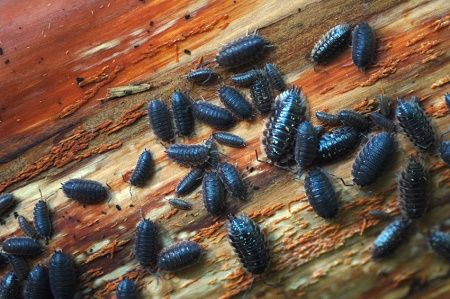
Though often seen as cute and harmless, pill bugs (aka rollie-pollies) and sow bugs can be quite the little pests if they decide to invade your home or yard in great number. A staff writer for Springerpest.com had this to say about these insects:
“These funny-looking bugs are closer in relation to shrimp and crayfish than their cousins in the Crustacea class of insects. Sow bugs typically have two appendages at the tip of their abdomen. Meanwhile, pill bugs lack appendages all together and are commonly called Rolly-Pollies.
These guys usually live outdoors, feeding on decaying organic matter, young plants and roots. Pill bugs and sow bugs hang out around flower bed mulches, grass clippings, leaf litter, rotting boards, trash, and rocks. Thankfully, they are not vectors and don’t carry disease, and unable to live for long indoors.
But pill bugs and sow bugs do crawl for cover. It’s in damp basements and crawl spaces where they launch their home invasions. Pill bugs and sow bugs are vampires (minus the fangs) who remain under objects on damp ground during the day and only become active after sunset when the temperature falls.
Thankfully, they are spring and summertime-only pests. Pill bugs and sow bugs are inactive during winter months. But if you spy one pill bug or sow bug, you’ve likely spotted an army. Heavy infestations of pill bugs and sow bugs usually indicate a large population residing right outside the building.
Adequate moisture is essential for pill bugs and sow bugs survival, which leads them to group in masses to reduce water loss.
How do you tell sow bugs and pill bugs to get lost for good?
Destroy Their Habitat. Preventing a sow bug or pill bug infestation starts outdoors by removing harbor aging locations that hold moisture, like wood debris, rocks, grass and leaf clippings, and debris around foundation walls, doors, basement windows and other points of entry. Store firewood off the ground. Water your lawn in the morning to ensure your grass is dry in the afternoon. Remember, flowerbeds are sow bugs’ and pill bugs’ favorite hotels, so don’t over mulch your bed.
Bug-wire Your House. Now go inside and ensure your basement and entry points are not prime real estate for sow bugs and pill bugs. Properly ventilate basements and subfloor crawl spaces to eliminate excessive moisture. Repair and seal cracks and openings in your foundation walls, around doors, and basement windows with caulking compound and weather stripping (all doors should be weather stripped). Drain and remove any standing water and moisture around potential points of entry.
Terminate The Colony. Apply professional residual insecticides around your home’s exterior foundational walls about three feet long for a perimeter treatment. D-Fense SC Cyper Wp is an extremely effective perimeter treatment. Then spray entry points, cracks and crevices and baseboards. D-Fense WC doesn’t leave visible residue on dark surfaces and is a good weapon for entry points like doors and windows. Aerosol sprays like Micro Care Pyrethrum are also proven pillbug and sowbug killers. Re-apply liquid residual and granule treatments like Bifen LP every three months to maintain a strong defense shield around your home. Granule treatments offer an advantage over liquid residuals because they hold up under rainfall.”
Like most insects, sow bugs and pill bugs can be stubborn home invaders. For troublesome lingering home invasions of these and other pests, consult us at Homestead Pest Management! Contact us today to learn more about all the services we offer or to schedule an assessment for your home or property.
Ants in your PANTry?
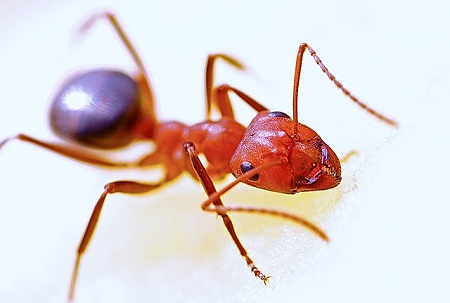
Where do these clever little pests come from? Sometimes it seems they materialize out of nowhere and are able to find a way in your home when there is no way – it can be really frustrating! Fortunately, Homestead Pest Management (HPM) can help take care of them before they carry off anything too valuable.
Ants are among the most common and prevalent household pests. Not limited to houses and gardens, ants also invade any place that provides them with food and water. While they do have a few beneficial contributions to our ecosystem, they conversely nurture insects such as aphids, soft scales, whiteflies, and mealybugs, increasing the damage from these pests to both outdoor and sometimes indoor plants. Our goal at Homestead Pest Management is to help you eliminate these pesky little bugs and keep them from returning to ruin more than just a picnic.
Texas A&M University’s Agri-Life Extension office’s pamphlet on “Managing Household Ant Pests” says:
“To manage an ant infestation in the home, you must first identify the species. The next step is to learn about the biology of that species and determining where the colony might be nesting.” Our professionals at HPM will come out and do an assessment of the property that needs treating, and decide exactly what type pf problem you have before discussing possible plans of attack.
Don’t put up with the ANT-ics of these tiny pests – let the HPM team take care of all your pest-control needs. Contact us today to begin your customized plan of care for your home, yard, business, or other property.
Happy 4th of July from Homestead Pest Management!

Managing the Mosquito Menace with HPM
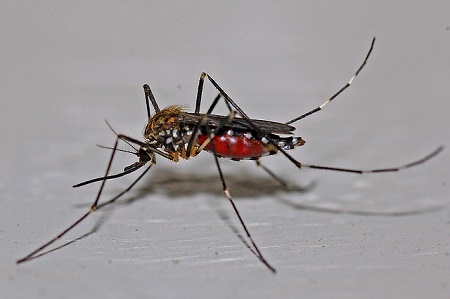
National Geographic.com tells us that “few animals on Earth evoke the antipathy that mosquitoes do. Their itchy, irritating bites and nearly ubiquitous presence can ruin a backyard barbecue or a hike in the woods. They have an uncanny ability to sense our murderous intentions, taking flight and disappearing milliseconds before a fatal swat. And in our bedrooms, the persistent, whiny hum of their buzzing wings can wake the soundest of sleepers.”
“Beyond the nuisance factor, mosquitoes are carriers, or vectors, for some of humanity’s most deadly illnesses, and they are public enemy number one in the fight against global infectious disease. Mosquito-borne diseases cause millions of deaths worldwide every year with a disproportionate effect on children and the elderly in developing countries”
“There are more than 3,000 species of mosquitoes, but the members of three bear primary responsibility for the spread of human diseases. Anopheles mosquitoes are the only species known to carry malaria. They also transmit filariasis (also called elephantiasis) and encephalitis. Culex mosquitoes carry encephalitis, filariasis, and the West Nile virus. And Aedes mosquitoes, of which the voracious Asian tiger is a member, carry yellow fever, dengue, and encephalitis.”
“Mosquitoes use exhaled carbon dioxide, body odors and temperature, and movement to home in on their victims. Only female mosquitoes have the mouth parts necessary for sucking blood. When biting with their proboscis, they stab two tubes into the skin: one to inject an enzyme that inhibits blood clotting; the other to suck blood into their bodies. They use the blood not for their own nourishment but as a source of protein for their eggs. For food, both males and females eat nectar and other plant sugars.”
“Mosquitoes transmit disease in a variety of ways. In the case of malaria, parasites attach themselves to the gut of a female mosquito and enter a host as she feeds. In other cases, such as yellow fever and dengue, a virus enters the mosquito as it feeds on an infected human and is transmitted via the mosquito’s saliva to a subsequent victim.”
“The only silver lining to that cloud of mosquitoes in your garden is that they are a reliable source of food for thousands of animals, including birds, bats, dragonflies, and frogs. In addition, humans are actually not the first choice for most mosquitoes looking for a meal. They usually prefer horses, cattle, and birds.”
“All mosquitoes need water to breed, so eradication and population-control efforts usually involve removal or treatment of standing water sources. Insecticide spraying to kill adult mosquitoes is also widespread. However, global efforts to stop the spread of mosquitoes are having little effect, and many scientists think global warming will likely increase their number and range.”
At Homestead Pest Management, we offer the latest in Mosquito Control! We have several services and packages to accommodate everyone’s budget. We can also install the MistAway System and service your system all summer long. Don’t let mosquitoes ruin your summer cookout or wedding, Contact Homestead Pest Management today for your peace of mind.
